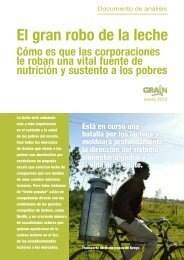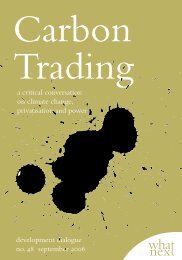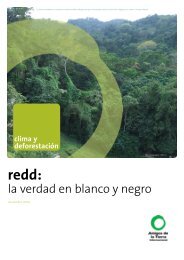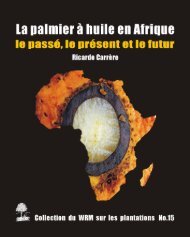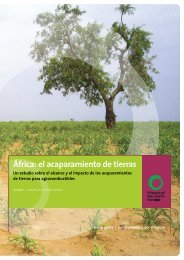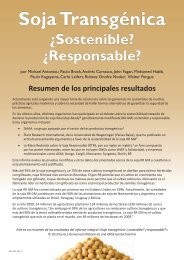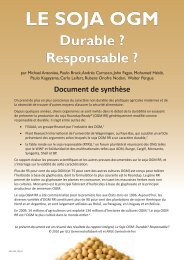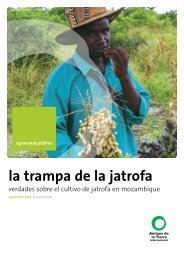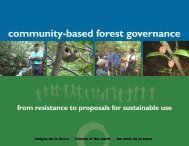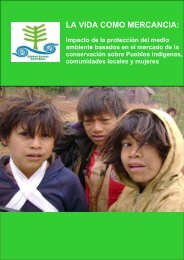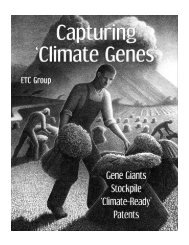Plantations, poverty and power - Critical Information Collective
Plantations, poverty and power - Critical Information Collective
Plantations, poverty and power - Critical Information Collective
You also want an ePaper? Increase the reach of your titles
YUMPU automatically turns print PDFs into web optimized ePapers that Google loves.
137<br />
integrated set of common Principles <strong>and</strong> Criteria for all types of management units rather than the current<br />
structure with a common set of nine principles <strong>and</strong> an additional Principle 10 for <strong>Plantations</strong>.” The Board<br />
of Directors decided to ignore this recommendation, to allow FSC members <strong>and</strong> “stakeholders” to “be<br />
given the opportunity to comment on this proposal before embarking on such a restructuring of the P&C”.<br />
The result of this is that six years after the motion passed at the General Assembly, no concrete proposals<br />
have been made for any amendments to the most problematic of FSC’s Principles (apart from changing<br />
the word “should” to “shall”).<br />
Bizarrely, given that the Policy Working Group recommended abolishing Principle 10, one of the<br />
<strong>Plantations</strong> Review Technical Expert Teams is looking at the 1994 cut-off date for conversion of forests<br />
to plantations. This is covered in Criterion 10.9, which states that if a plantation manager has cleared<br />
forest in order to establish plantations since November 1994, then that operation cannot “normally” be<br />
certified under FSC. There are problems with this, since it does not exclude certification of plantations<br />
established since 1994 on grassl<strong>and</strong>s, for example. An improvement would be, for example, prohibiting<br />
the conversion of grassl<strong>and</strong>s <strong>and</strong> other ecosystems to plantations.<br />
The Policy Working Group proposed another review to look at conversion, which will consider other<br />
ecosystems. However, the Policy Working Group also suggested that the review should reconsider the<br />
1994 cut-off date, partly on the grounds that the current system “may exclude responsible managers who<br />
had never heard of FSC in 1994 <strong>and</strong> converted from natural forest to plantation in good faith, but who are<br />
now locked out of the certification process.” Asia Pulp <strong>and</strong> Paper is among the companies that has been<br />
lobbying for this change. 654<br />
In its vision for FSC, the <strong>Plantations</strong> Review Policy Working Group hopes to see a “significant dem<strong>and</strong><br />
for certified forest [sic] products” within ten years. In the context of a <strong>Plantations</strong> Review this is an<br />
extraordinary statement. Many industrial tree plantations provide raw material for the pulp <strong>and</strong> paper<br />
industry. The Policy Working Group is therefore hoping for a “significant dem<strong>and</strong>” for paper products.<br />
This undermines both local struggles against industrial tree plantations <strong>and</strong> NGO campaigns in the North<br />
aimed at reducing the consumption of paper.<br />
The Policy Working Group did not raise the bar, it lowered FSC’s st<strong>and</strong>ards. This is an inevitable result<br />
of its wish for a “significant dem<strong>and</strong> for certified forest [sic] products”. FSC is far too keen to p<strong>and</strong>er to<br />
the industry that it is supposed to be regulating (albeit on an entirely voluntary basis).<br />
During an NGO meeting in 2004, FSC’s Sofia Ryder explained how FSC was trying to make things<br />
easier for the industry:<br />
“We’re trying to unblock the supply chain. We’re trying to make certification more accessible. We’re<br />
trying to strengthen the st<strong>and</strong>ards <strong>and</strong> tighten them. We’re trying to improve incentives <strong>and</strong> rewards for<br />
people to become involved in certification, <strong>and</strong> we’re trying to bring more FSC products into the<br />
market.” 655<br />
654 At the 2004 meeting to launch FSC’s <strong>Plantations</strong> Review, one of the people who questioned the 1994 cut-off date<br />
was Arian Ardie, then-director for sustainability at Asia Pulp <strong>and</strong> Paper. Obviously APP had an interest in changing this<br />
cut-off date, given the vast area of forests that the company has cleared since 1994.<br />
655 “Presentation by Sofia Ryder, FSC at Forest Movement Europe meeting”, 24 April 2004, Helsinki.



